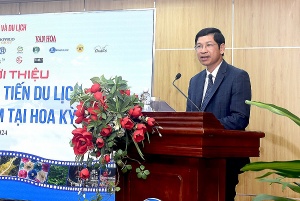Vietnam missing out on filmmaking boom
Minister of Culture, Sports and Tourism Nguyen Van Hung highlighted last week that cinema and tourism are two pivotal sectors within Vietnam’s 12 cultural industries.
 |
| Vietnam missing out on filmmaking boom, illustration photo/ Source: freepik.com |
Speaking at a seminar on attracting global filmmakers to Vietnam, the minister said, “The power of cinema extends beyond its artistic value. It influences culture and tourism. If Vietnam can effectively integrate cinema with tourism, it will significantly enhance the country’s appeal to international visitors.”
With its breathtaking landscapes, rich cultural heritage, diverse cuisine, and warm hospitality, Vietnam is uniquely positioned to leverage cinema as a tool for promoting tourism and establishing itself as a global filmmaking hub.
According to Hung, the tourism sector must take proactive steps to showcase these strengths to the world. “If we stay behind closed doors, no one will know what Vietnam has to offer,” he said, underlining the need for strategic, large-scale marketing campaigns to raise the country’s profile.
Nguyen Trung Khanh, director of the Vietnam National Authority of Tourism, further underscored cinema’s potential to drive tourism, citing international case studies.
“After The Lord of the Rings premiered in 2001, tourism in New Zealand surged by 50 per cent. In the UK, the Harry Potter films boosted visitor numbers to filming locations by 230 per cent between 2011 and 2014,” he said.
Khanh added that Vietnam’s natural and cultural assets, ranked 26th and 28th globally by the World Economic Forum in 2024, provide a strong foundation for developing a synergy between both tourism and cinema.
He highlighted the success of Kong: Skull Island, filmed partly in Halong Bay and the northern province of Ninh Binh before its release in 2017, which showcased Vietnam’s potential as a prime location for international film productions.
In particular, Ninh Binh has witnessed significant tourism growth due to its exposure in global cinema. Bui Van Manh, director of Ninh Binh’s Tourism Department, said that films have played a crucial role in attracting international tourists.
“In 1992, the film Indochine featured scenes shot at the Tam Coc tourism area, and following its release, the location gained widespread recognition, particularly among French tourists. Today, visitors from France and the rest of Europe account for 80 per cent of the tourist population in the area,” Manh said.
Building on this success, the Ministry of Culture, Sports, and Tourism is preparing to launch a cinema-tourism promotion campaign in the United States, targeting Hollywood directors and producers. “We will showcase Vietnam’s unique potential as a filming location to attract major filmmakers. In return, these films will serve as powerful global marketing tools for Vietnam’s tourism,” he said.
Despite the opportunities, Vietnam still faces issues in attracting international filmmakers.
Cao Tri Dung, chairman of the Vietnam Association of Travel Agents, noted that the country lacked a comprehensive national and local strategy to attract film crews. “We need clear policies to support filmmakers, and the Ministry of Culture, Sports, and Tourism should lead by coordinating efforts with local authorities and businesses,” he said.
Dung added that Vietnam has been slow to actively invite and support international film crews, and effective promotion remains a key obstacle.
Ngo Phuong Lan, chairwoman of the Vietnam Association for the Promotion and Development of Cinema, compared Vietnam to regional competitors, noting that Thailand welcomes 100-200 film crews annually, while Vietnam hosts fewer than 10.
“If we don’t offer competitive incentives, film crews will opt for countries with similar landscapes, like Thailand or the Philippines. Vietnam is missing out on valuable opportunities,” she warned.
Nguyen Chau A, CEO of Oxalis Adventure, noted that Vietnam offers a fresh alternative to more familiar filming locations in Southeast Asia. “Filmmakers are drawn to Vietnam for its diversity, but they face difficulties in obtaining permits, securing on-site support, and navigating complex regulations. There is also a need for greater transparency, better security during filming, and tax incentives,” he said.
He also pointed out that Vietnam lacked the skilled production crews necessary to support large international film projects, which is a significant barrier to attracting major productions. “Vietnam’s shortage of professional film crews and production support is a major obstacle for large-scale projects,” he added, calling for more investment in building robust support infrastructure for international film productions.
| Bui Van Manh, director Ninh Binh Department of Tourism Ninh Binh offers a stunning natural landscape and rich cultural heritage, but faces challenges in infrastructure and resources, particularly in terms of high-end hotels and services needed to support international film crews. Currently, we rely on external services, making it difficult to meet production demands. To attract international filmmakers, Ninh Binh and other regions need a coordinated national strategy. Firstly, supportive policies should be developed to foster the domestic film industry and create culturally significant works that promote Vietnam globally. Secondly, a centralised support system is crucial to assist film crews from the initial procedures through to production, ensuring smooth operations by connecting resources and addressing issues promptly. Lastly, financial backing is key. Relying solely on a few investors or state funds is unsustainable. Establishing venture capital funds will provide filmmakers with the resources needed to undertake large-scale projects, ensuring high-quality film productions in Vietnam. |
 | Vietnam to launch tourism and film industry campaign in US The Ministry of Culture, Sports, and Tourism plans to hold a tourism and film promotion campaign in the United States during the third and fourth quarters of 2024. |
 | Vietnam to roll out tourism and cinema promotions in US Vietnam is looking to develop its tourism and film industry in the US through promotions organised by the Ministry of Culture, Sports, and Tourism at the end of September. |
What the stars mean:
★ Poor ★ ★ Promising ★★★ Good ★★★★ Very good ★★★★★ Exceptional
 Tag:
Tag:
Related Contents
Latest News
More News
- Hermes joins Long Thanh cargo terminal development (February 04, 2026 | 15:59)
- SCG enhances production and distribution in Vietnam (February 04, 2026 | 08:00)
- UNIVACCO strengthens Asia expansion with Vietnam facility (February 03, 2026 | 08:00)
- Cai Mep Ha Port project wins approval with $1.95bn investment (February 02, 2026 | 16:17)
- Repositioning Vietnam in Asia’s manufacturing race (February 02, 2026 | 16:00)
- Manufacturing growth remains solid in early 2026 (February 02, 2026 | 15:28)
- Navigating venture capital trends across the continent (February 02, 2026 | 14:00)
- Motivations to achieve high growth (February 02, 2026 | 11:00)
- Capacity and regulations among British areas of expertise in IFCs (February 02, 2026 | 09:09)
- Transition underway in German investment across Vietnam (February 02, 2026 | 08:00)




















 Mobile Version
Mobile Version